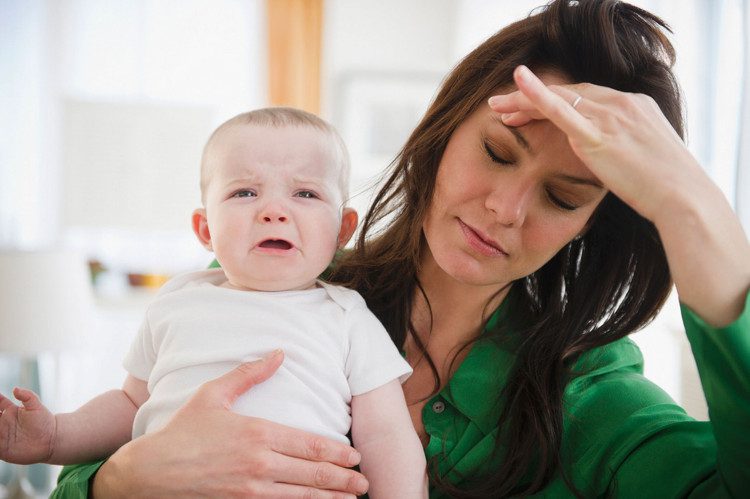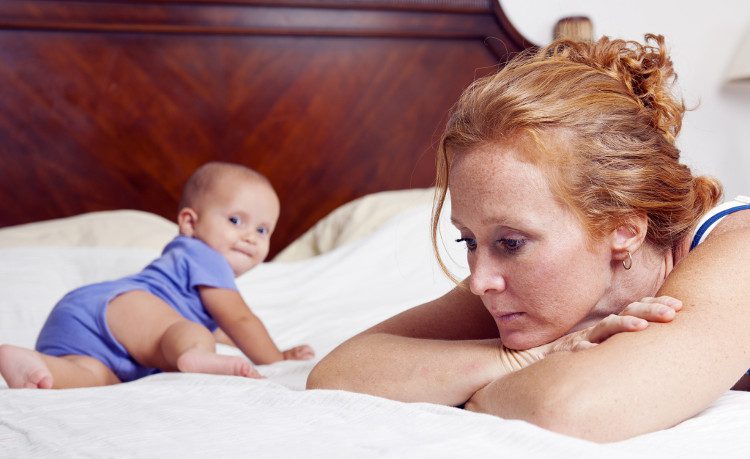Women are divinely bestowed with the sacred duty of motherhood, which is a source of pride for all women. However, this calling comes with various health issues related to childbirth. One of these conditions is postpartum depression, affecting approximately 13% of mothers after giving birth.
Essential Information About Postpartum Depression
After giving birth, a woman experiences significant changes both mentally and physiologically. Mothers go through a period filled with anticipation for their child’s arrival, joyfully welcoming their little angel. However, approximately 85% of mothers experience fleeting feelings of sadness, commonly referred to as “baby blues”, characterized by symptoms such as feeling sad and bored, difficulty sleeping, irritability, changes in appetite, and concentration problems. These symptoms are common in the first few days postpartum and typically last no more than two weeks due to hormonal changes immediately after birth. If these symptoms persist beyond two weeks, it indicates a condition known as postpartum depression.
What Causes Depression?

Approximately 85% of mothers experience fleeting feelings of sadness, known as “baby blues.”
Immediately after birth, a rapid change in hormone levels occurs, particularly a decrease in estrogen and progesterone, along with a reduction in thyroid hormone levels, leading to fatigue and depression. The hormonal decline, combined with changes in blood pressure, immune system function, and metabolic alterations that postpartum mothers must undergo, contributes to the onset of depression.
Postpartum women also face numerous physical and psychological challenges. The pain from childbirth, especially after a cesarean section, can persist for several weeks postpartum. Psychological issues may arise as mothers feel they have lost significant weight, often leading to feelings of unattractiveness. They must adjust their lifestyles to care for their newborn, particularly first-time mothers who may feel overwhelmed by their new responsibilities.
Risk factors for postpartum depression include a history of depression, which can lead to recurrence after childbirth, stressful events during pregnancy or childbirth, such as complications during delivery, health issues with the newborn, premature birth, or illness during pregnancy. Additionally, women in unhappy marriages or lacking family and social support are at a higher risk of depression.
What Are the Symptoms of Depression?

Lack of energy and motivation in life is one of the signs of postpartum depression.
If you notice feelings of sadness lasting more than two weeks along with the following symptoms:
- You no longer feel joy in your relationship with your child.
- You have negative feelings towards your child, such as resentment or lack of love.
- You worry about harming your child.
- You neglect to care for yourself.
- You feel dissatisfied with life.
- You feel drained and lack motivation.
- You feel worthless and guilty.
- You experience loss of appetite or weight loss.
- You sleep less or more than usual.
- You frequently have thoughts of death or suicide.
How Does Maternal Depression Affect the Child?
Children of mothers with postpartum depression may experience the following effects:
- Behavioral Issues: These children tend to exhibit abnormal behaviors, such as sleep disturbances, explosive behavior, irritability, and hyperactivity.
- Cognitive Delays: These children often show delays in cognitive development, such as speech and mobility, compared to their peers. They may also face difficulties in learning and other issues at school.
- Social Problems: These children often struggle with relationships at school and with peers, showing withdrawal from social interactions or exhibiting abnormal behaviors.
- Emotional Challenges: These children may have low self-esteem, increased anxiety and fearfulness, and are often more dependent, with a higher risk of developing depression and autism spectrum disorders.
How Is Depression Treated?
Effective treatment for depression typically involves a combination of different approaches: psychotherapy, hormone therapy, and antidepressant medications.
Psychotherapy, which includes individual or group therapy, is often the first choice of treatment as it does not involve medication and poses no risk to the infant if the mother is breastfeeding.

From pregnancy, rest and relaxation are crucial; avoid excessive stress and overthinking.
Hormone therapy, which may include estrogen replacement, can sometimes be effective for postpartum depression. Estrogen is used in conjunction with antidepressant medications.
In severe cases where mothers cannot care for themselves or their children, antidepressants may be necessary. However, if breastfeeding, a careful consideration of the benefits of medication versus potential side effects on nursing is essential, along with close monitoring by a specialist.
How to Prevent Depression?
It is important to equip yourself with knowledge about motherhood and to have the economic conditions ready for welcoming a new family member.
Expecting mothers should take care of themselves, as doing so is ultimately for their children. Avoid falling into a state of depression, as it not only affects you but also significantly impacts your beloved child.
From pregnancy, ensure you rest and relax, and do not stress or overthink your new role as a mother; there will be plenty of time to learn.
Family members should assist new mothers in caring for the child, allowing them time to rest and recover postpartum; sharing and addressing psychological issues with the mother is vital, with the husband playing an important role.
A nutritious diet is essential; do not excessively restrict food intake, which could lead to nutritional deficiencies for both mother and child. Ensure quality sleep whenever the baby sleeps…
Advice from Doctors
Doctors advise that women with a history of treated or ongoing depression, younger mothers, those who have experienced stressful events before childbirth such as illness, infertility, stillbirth, miscarriage, lack of support from their spouse, family conflicts, or unplanned pregnancies are more susceptible to postpartum depression.
Women who exhibit abnormal symptoms after childbirth should immediately consider the risk of depression to seek timely medical attention.
According to Dr. Vu Kim Hoan from Ho Chi Minh City Psychiatric Hospital, urbanization, life challenges, and increasing work pressure lead to conflicts in family and society. If we cannot adapt to these changes and pressures, it can easily lead to depression and a range of other health issues. Over time, this can result in chronic sadness, pessimism, and potentially suicidal thoughts.
Women aged 30-40 and older are particularly vulnerable to depression. Women postpartum, and those who have experienced strokes, seizures, Parkinson’s disease, or diabetes are also at higher risk of depression.
Notably, patients often lack awareness of their condition and, due to the stigma surrounding mental illness, may resist seeking help at psychiatric hospitals. When experiencing unusual symptoms, they often attribute their issues to physical ailments and seek treatment in other specialties such as cardiology, gastroenterology, or neurology.
If they visit multiple clinics without improvement and their condition worsens, they may eventually seek treatment at a psychiatric facility or be referred by non-specialist healthcare providers.
Dr. Hoan emphasizes that due to life’s pressures and family conflicts, everyone may experience a bout of depression, so it is crucial to recognize and detect unusual symptoms to adjust one’s life accordingly. When symptoms worsen, seeking specialized treatment is essential.
To prevent postpartum depression, it is essential to pay attention to both the nutrition and mental well-being of expectant mothers from the moment they become pregnant. Women should actively participate in positive activities such as walking, light exercise, and listening to relaxing music to maintain a cheerful and stable mood.
After giving birth, women need to adopt a suitable lifestyle that includes reasonable rest, gentle walks, and adequate nutrition. They should avoid putting pressure on themselves to do everything, refrain from isolating themselves, and strive to open up to loved ones, seeking help when necessary. Finally, women need empathy and support from their partners and family members.




















































